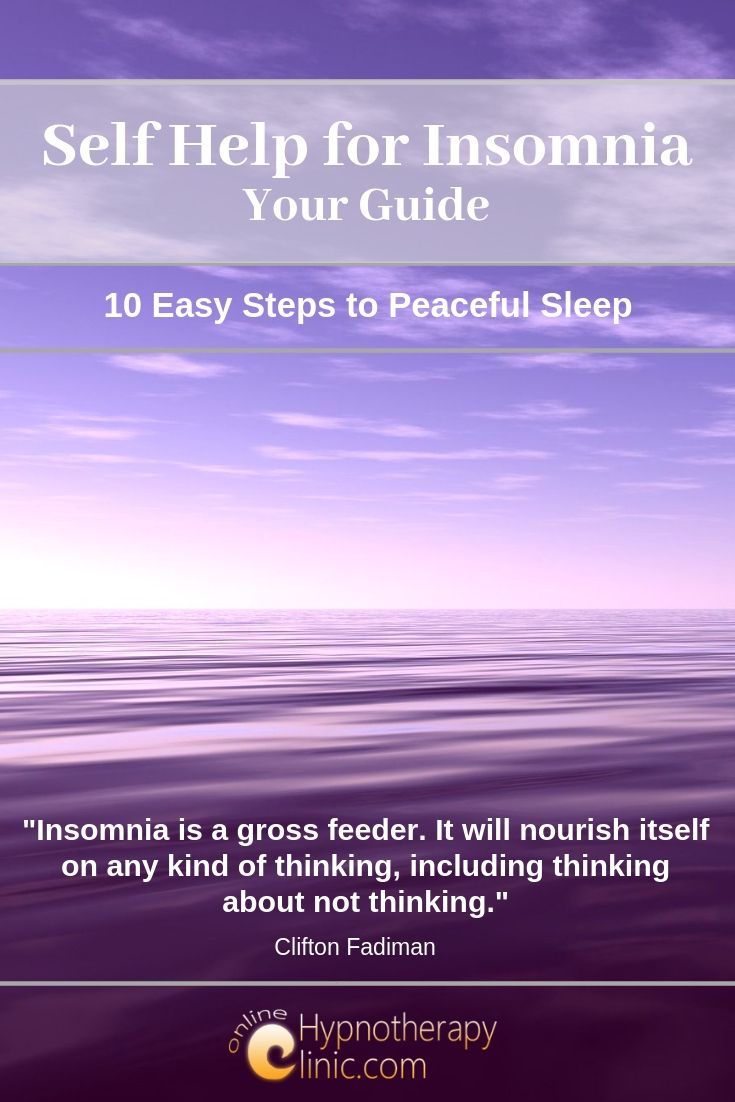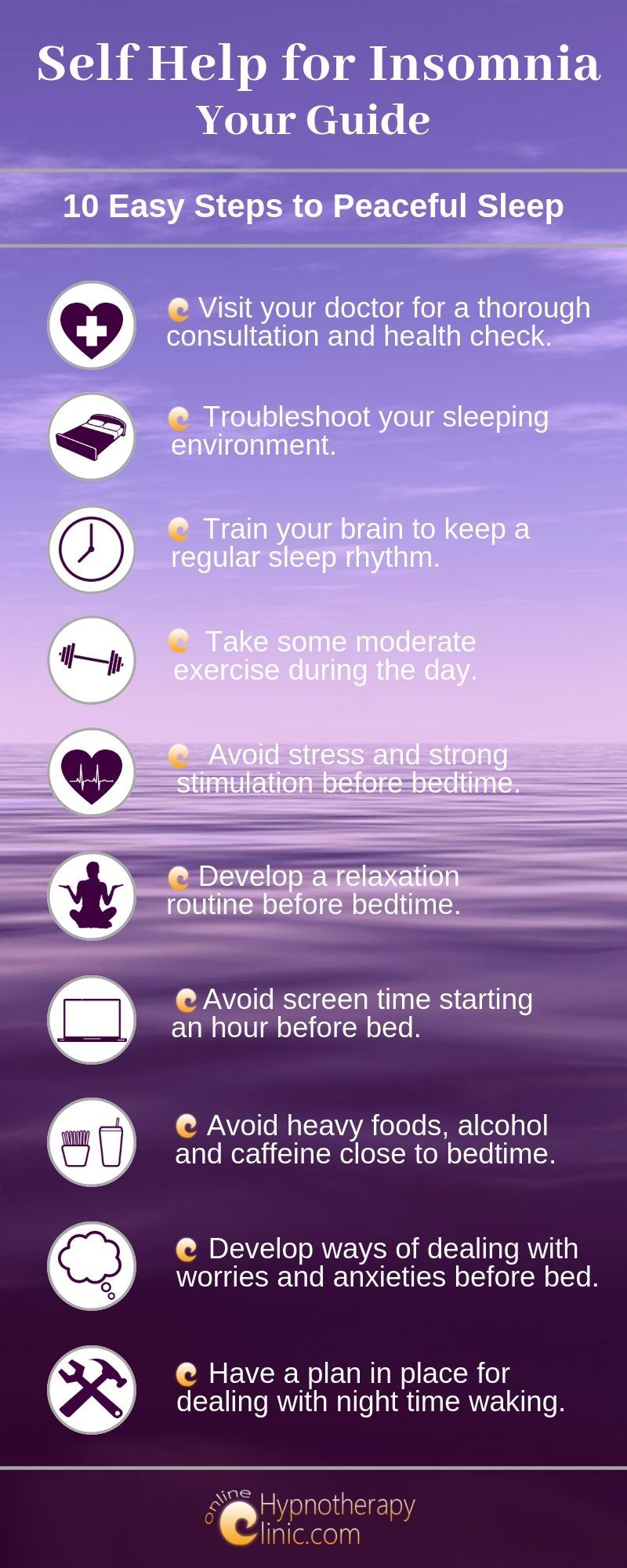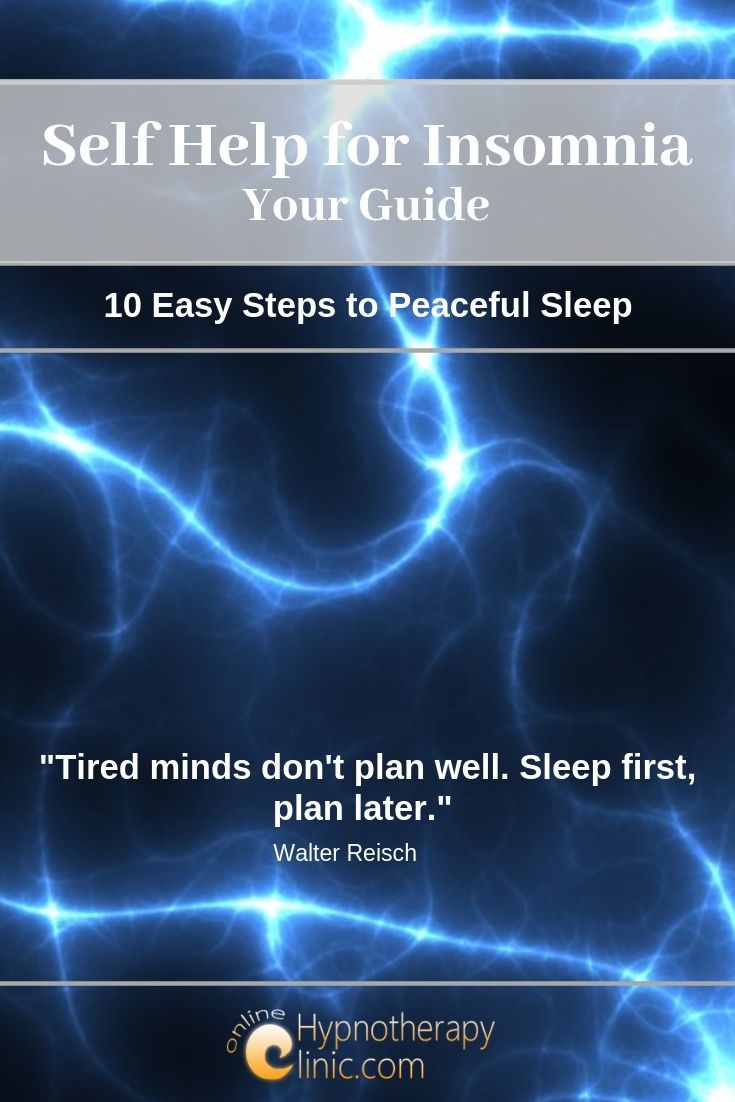Self Help for Insomnia- Your Guide
By Susanna Sweeney, MSC, MBACP, CHT
This article focuses on self help for insomnia- giving you tips on simple life style changes and troubleshooting of your sleep hygiene that can help you fix your sleep issue by yourself.
Most people can at least achieve an improvement of their insomnia this way,. However, if there are underlying health issues you may need to consult a professional.
Let's face it- adequate sleep is absolutely essential if you want to maintain your health and well being. If you have been suffering from insomnia for a while, don't despair, there is a lot you can do to get things back on track.
I have broken my insomnia self help down into ten easy to implement steps that I recommend you work through. You are in with a good chance that your sleep will improve when you work through this guide.
Self Help for Insomnia- 10 Easy Steps for Peaceful Sleep
1. Consult Your Doctor
You should always start by paying a visit to your doctor- for a number of reasons:
- There are certain health conditions which may be causing your insomnia. These conditions include asthma, hyperthyroidism, acid reflux, allergies and some more serious conditions. With the help of your doctor you should rule these out first because if you were diagnosed with one of these you would require medication or another form of treatment.
- If you suffer from chronic pain which is keeping you awake at night, your doctor is the go-to person for pain management.
- Your body prefers a regular routine- one which is aligned with night and day that lets you sleep when it's dark outside and has you awake when it's bright. If you do shift work and suffer from insomnia, there is a chance that shift work does not agree with you in which case you should talk to your doctor.
- Furthermore, some prescription medications or certain combinations of medications you are taking may cause insomnia. You are well advised to have a thorough consultation about this with your doctor or pharmacist to get the combination of drugs just right for you.
- Discuss the possibility of supplementation with your doctor. The sleep hormone melatonin could be an option. You should also consider supplementing with magnesium which most people om Western diets are deficient in. Magnesium is a major player in nervous system function, and deficiency can-among other things, lead to insomnia.
- Mayo Clinic remind us that your doctor will be able to advise you whether you need to attend a sleep center where your sleep would be monitored to get to the bottom of what is causing your insomnia.
2. Your Sleeping Environment
Next comes trouble shooting your sleeping environment. Is your bedroom too noisy, too bright, too warm, or too stimulating to be able to relax? Is your mattress comfortable for your unique physique?
If you get physically uncomfortable and restless during the night you may be well advised to visit a good quality mattress shop where you can get advice on what type of mattress is right for you.
Some people are highly sensitive and react to the minute EMF's that are produced by the metal springs in mattresses and are better off with a foam mattress- or, even better with a mattress made from natural materials. other people just need to tweak the hardness/ softness of their mattress so their body can let go and relax completely.
Beyond that the advice generally is to:
- Keep your bedroom dark because this encourages the body to produce the sleep hormone melatonin.
- Make sure the atmosphere in your bedroom is restful. Take care of any noise you may be exposed to- ear plugs may help if all else fails.
- The temperature of your bedroom should be somewhat cooler than the rest of the house. This helps your body to settle better.
- Fresh air is fantastic for you while you are sleeping- ideally your bedroom should be ventilated properly. The air in your bedroom should never become stale during the night. If it does, see if you can tweak things like leaving the bedroom door open at night to make sure you have a supply of fresh oxygen through the night.
- Avoid keeping any devices that produce EMF's in your bedroom, this includes television sets, laptops, desktops, smartphones, tablets and even radio clocks. as I mentioned already- EMF's may interfere with your sleep, so don't take a chance. If you need to set an alarm on your phone, set the ringer to maximum volume and keep your phone in the next room.
- Make any extra changes that make your sleeping environment cozy and welcoming for you. This can include nice fabrics, the exact right type of pillow for your needs (some people prefer soft, some prefer hard) other items that comfort you like the right kind of pajamas and perhaps calming essential oils such as lavender or Frankincense.
3. Your Body Loves a Regular Rhythm
Your subconscious mind has an inbuilt timer. You can train yourself to fall asleep at the same time each evening, and to wake up at the same time each morning.
To set or reset your sleep rhythm all you need is a couple of weeks of regularity where you diligently make sure that you go to bed at the exact same time, and set your alarm for the exact same time. Your inbuilt subconscious timer will eventually understand what you want it to do.
You can help this process along by keeping a sleep diary where you record exactly what you did before bed each night, and exactly what your sleeping pattern was like that night. You may soon see a pattern emerge that you can then use to make improvements.
As well as working on your sleep rhythm you also have to take care of all other items in this article however. Just practicing a regular rhythm on its own probably won't relieve your insomnia if you are also taking in caffeine or watching TV in your bedroom, for example.
4. Exercise
Ideally, you should get some exercise each day. Exercise can help you sleep better- but only if it's practiced well before bedtime and in moderate measure. You could go for a walk, go swimming, or cycling some time before bedtime. The idea is not to work out hard and to push yourself. It's just to get your body moving.
On a busy day, a walk on your way home from work may be all you are able to fit in, but some movement is better than none. Do what you can and most importantly don't stress over it because stress is the antidote to relaxation and sleep.
5. Avoid Stress Before Bedtime
A dedicated wind down routine can be very helpful at night time. During this time, you are preparing your physiology to gradually calm down and relax. This requires avoiding stress of any kind- be it housework or checking work emails. Set a cut off time for yourself for when to stop taking on anything stressful.
6. Relaxation Routine Before Bedtime
It's a good idea to include a relaxation routine in your wind down routine, just before bedtime. Gentle yoga is often recommended here, as are meditation, guided meditation, relaxation hypnosis and hypnosis for insomnia.
You can try things out and see what works best for you. What you want to achieve is a very deep level of relaxation where both your muscles and your mind wind down completely.
Does Sleep Hypnosis Work?
- In a recent review of the available research on sleep hypnosis across 24 studies, hypnosis was found to produce significant improvements in sleep in 58.3% of cases.
- Find more evidence in my article "Insomnia Hypnotherapy- Does it Really Work? The Science"
7. Avoid Screens
Your wind down routine and screen time are mutually exclusive as they would work against one another. From about an hour before you go to bed you should leave all your devices with screens aside. Screen emit blue LED light which excites the nervous system in such a way that it can interfere with relaxation and sleep.
8. Food and Drink
Food and drink intake, too, are important to look at when you are looking to improve your sleep.
- You should have your heavy meal of the day a good few hours before bedtime, followed only by lighter food. This is because digesting a heavy meal can interfere with your body winding down.
- Naturally, where caffeine might be welcome in the mornings when you have to get going, it could interfere with winding down at night time. At the very least do reduce your caffeine intake in the second half of the day, ideally avoid it altogether.
- When you drink alcohol at night it may seem like it's helping you to relax. You may find however, that you then wake up during the night and find it hard to settle back. this is because alcohol interferes with your sleep pattern. Some people can have one drink at bedtime, others find they are best off leaving alcohol alone altogether at this time. See what is right for you.
9. Worries and Anxieties
Self help for insomnia must include dealing with worries and anxieties effectively as those are the worst perpetrators in keeping you awake or prolonging wakefulness during the night.
Any issues that require any level of emotional involvement and are potentially worrying or could lead to night time anxiety should ideally be dealt with before the wind down routine commences.
This is not always easy to achieve when life is busy.
An alternative is to commence the wind down routine with twenty minutes of writing in a notebook or diary to get worries off your chest. Writing a to-do list for the next day/ week is also useful here as it means you don't need to hold these items in your awareness overnight and can let go completely.
You should also avoid any confrontations or arguments during this time- if you have a choice at all then schedule these types of conversations for a time earlier in the day.
10. An Action Plan for Night Time Waking
If you are prone to waking up during the night, it's important to have a plan in place so that you can stay as calm as possible. Worrying about losing sleep can lead to a nasty self fulfilling prophecy- the more you worry, the more sleep you will lose.
Here are some insomnia self help items that I recommend when you wake up during the night:
- If you are wide awake, it's a good idea to get up, even if it's just for a visit to the bathroom or for a few stretches. Getting up briefly can shake things up a bit so you don't lie there in frustration. When you go back to bed, your body and mind interpret this as going to bed all over again.
- When you are going back to bed, focus on relaxing your body. Avoid making sleep your goal as such.
- Physical comfort is important. If any part of you is in pain, you won't be able to relax completely. Do what you have to do to settle that discomfort.
- You might want to use a relaxation method as you did when you were settling before bed. You might choose to play a different track on your MP3 such as self hypnosis for sleep.
- If there are emotions around, you can use the finger hold tool which helps you to balance and process your emotions. You can work through all of your fingers and do it more than once, until you find some relief.
- Make relaxation your only focus. There will always be that temptation to work out problems or worries but that's about the worst thing you could do in the middle of the night.
- If, after removing screens and radio clocks from your bedroom, there is still a clock of some kind around you- avoid looking at it. Checking the time will very likely make you tense and bring on worry or anxiety about losing sleep which will make things worse.
More About Healing with Hypnotherapy
More About Healing with Hypnotherapy
Hypnosis and Trauma
What are the most suitable trauma tools in the hypnosis world? What should you look for in a hypnotist if you want to use hypnosis to deal with trauma?
Free Yourself From Depression With Hypnosis
Hypnotherapy for Mental Health
Find out why hypnotherapy is so well suited to reducing and ultimately clearing mental health symptoms such as anxiety, depression and low self esteem symptoms.
Depression Self Help- The Ultimate Guide
This comprehensive guide introduces you to easy and effective concepts, tools and processes you can use at home to help improve your symptoms of depression.
Depression Hypnosis- 7 Major Benefits for You
Depression hypnosis is often the last option considered on a long list of depression interventions. In this article I will make the case for seven major benefits in store for you when you choose to work with depression hypnosis.
Hypnotherapy for Depression- Jason's Story
In this article, meet Jason- a client who attended me for hypnotherapy for depression. His story is designed to give you a good, realistic feel for the 'before and after' snapshots, so that you know what you can expect from hypnotherapy for depression.
Hypnosis for Depression- Jason's Journey Towards Recovery
Find out what a typical journey of recovery from depression looks like when you use a thorough hypnotherapy program.
Self Hypnosis for Depression- 9 Major Benefits for You
Self hypnosis for depression is a much underrated self help tool. In this article I will make the case for nine major benefits for you if you decide to use this fantastic self help tool.
Improve Your Self Esteem With Hypnotherapy
Find out tools, tips and ten steps on how you can support yourself in building your self esteem.
Self Esteem Hypnosis- Does it Really Work?
In this article i discuss the available scientific evidence that backs self esteem hypnosis, present a client case study that demonstrates how hypnosis for self esteem can change your life, and finally outline five major benefits of self esteem hypnosis.
Hypnosis for Self Esteem- Why Most People Should Consider it
Here, I make the case for self esteem hypnosis to be used as a cornerstone of any hypnosis program. Find out why...
The Most prominent benefits of self esteem hypnosis which can help you change your life for the better.
Boost Your Confidence With Hypnosis
Hypnosis for Confidence- A Success Story
This article gives you an insight into client work and how confidence hypnosis helps people change their lives.
Confidence Hypnosis- Could it Benefit You?
In this comprehensive article, find out what confidence hypnosis is, how it works and what it could do for you.
Find out if self hypnosis is the right tool for you for building confidence.
Get Rid of Fears and Phobias With Hypnosis
Hypnosis for Fears and Phobias- How it Can Help You
Hypnosis for fears and phobias is a fast, efficient and safe way to help you become symptom free and regain your quality of life. In this article learn what causes fears and phobias, how they present, how hypnotherapy can help and what scientific findings exist.
Improve Your Sleep
Learn how to reset your life for regular, peaceful sleep in 10 easy steps.
Find out 7 tremendous benefits this work could hold for you.
Insomnia Hypnotherapy- Does it Really Work?
Find out the science behind hypnotherapy for sleep.
7 Wonderful benefits sleep hypnosis has in store for you.
Migraine Hypnosis
Migraines are a serious issue affecting as many as one in 20 women and one in 15 men. Find out how migraine hypnosis can benefit you as part of your migraine relief plan.
Overcome Stress and Achieve Relaxation With Hypnosis
Hypnosis for Stress- Get Your Equilibrium Back
This article is designed to introduce you to hypnosis for stress relief, to what it is, why it is a suitable tool for overcoming toxic stress and on what it can do for you.
Hypnotherapy for Stress- A Success Story
Follow my client Jeffrey from being totally stressed out to getting back in charge of his life. See what's involved with hypnotherapy for stress reduction so that you can decide if you might want to give it a go.
Self Hypnosis for Stress- 5 Major Gains for You
See how you could benefit from self hypnosis for stress.
Find out how hypnosis for relaxation compares to other relaxation methods such as relaxation music and guided visualization.
How Relaxation Hypnosis Can Help You Change Your Life
This article is designed to introduce you to relaxation hypnosis, its benefits, how it works and why it may be help you to change your life.
How Relaxation Self Hypnosis Can Benefit You in 6 Ways
Find out how you could benefit from self hypnosis for relaxation so that you can decide if it is right for you.
Self Hypnosis Relaxation Techniques for You
Learn self hypnosis relaxation techniques that you can start to use at home today.
I hope you have found this page on self help for insomnia useful. In the comments underneath, let our community know how you are getting on using the tools you have learned here.
Here's to your relaxation and well being.
Regards,

Recent Articles
-
Havening Technique Training auf Deutsch
Apr 18, 25 02:59 AM
Havening Technique Training auf Deutsch- Details und Buchung -
Client Testimonials
Oct 06, 23 06:08 AM
Client Testimonials of my Online REPAIRenting® Program that uses various psychosensory approaches for safe and quick transformation -
Smoke Free Thanks to This Amazing Resource
Aug 02, 23 09:26 AM
Oh thank you for this simple resolution to all my worries! I feel like I have had a weight lifted off my shoulders. It is like cheating on giving up smoking.





New! Comments
What do you think? Leave a comment in the box below.